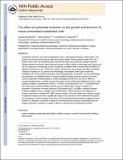The effect of substrate modulus on the growth and function of matrix-embedded endothelial cells
Author(s)
Murikipudi, Sylaja; Methe, Heiko; Edelman, Elazer R.
DownloadEdelman_The effect of substrate.pdf (1.107Mb)
PUBLISHER_CC
Publisher with Creative Commons License
Creative Commons Attribution
Terms of use
Metadata
Show full item recordAbstract
Endothelial cells (EC) are potent bioregulatory cells, modulating thrombosis, inflammation and control over mural smooth muscle cells and vascular health. The biochemical roles of EC are retained when cells are embedded within three-dimensional (3D) denatured collagen matrices. Though substrate mechanics have long been known to affect cellular morphology and function and 3D-EC systems are increasingly used as therapeutic modalities little is known about the effect of substrate mechanics on EC in these 3D systems. In this work, we examined the effect of isolated changes in modulus on EC growth and morphology, extracellular matrix gene expression, modulation of smooth muscle cell growth, and immunogenicity. EC growth, but not morphology was dependent on scaffold modulus. Increased scaffold modulus reduced secretion of smooth muscle cell growth inhibiting heparan sulfate proteoglycans (HSPGs), but had no effect on secreted growth factors, resulting in a loss of smooth muscle cell growth inhibition by EC on high modulus scaffolds. Expression of ICAM-1, VCAM-1 and induction of CD4[superscript +] T cell proliferation was reduced by increased scaffold modulus, and correlated with changes in integrin α5 expression. Expression of several common ECM proteins by EC on stiffer substrates dropped, including collagen IV(α1), collagen IV(α5), fibronectin, HSPGs (perlecan and biglycan). In contrast, expression of elastin and TIMPs were increased. This work shows even modest changes in substrate modulus can have a significant impact on EC function in three-dimensional systems. The mechanism of these changes is not clear, but the data presented here within suggests a model wherein EC attempt to neutralize changes in environmental force balance by altering ECM and integrin expression, leading to changes in effects on downstream signaling and function.
Date issued
2012-10Department
Harvard University--MIT Division of Health Sciences and TechnologyJournal
Biomaterials
Publisher
Elsevier
Citation
Murikipudi, Sylaja, Heiko Methe, and Elazer R. Edelman. “The Effect of Substrate Modulus on the Growth and Function of Matrix-Embedded Endothelial Cells.” Biomaterials 34, no. 3 (January 2013): 677–684.
Version: Author's final manuscript
ISSN
01429612